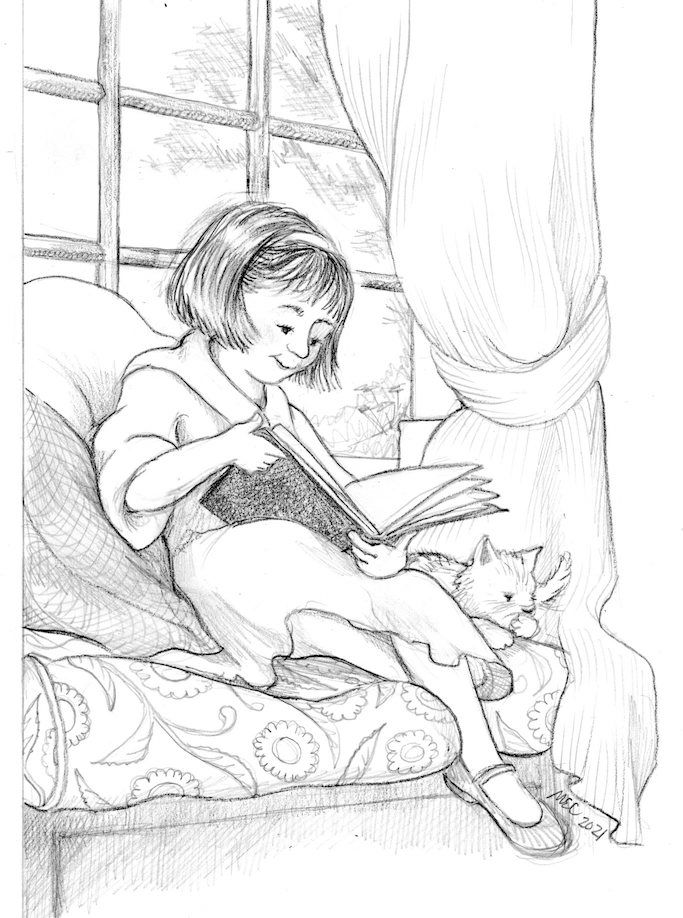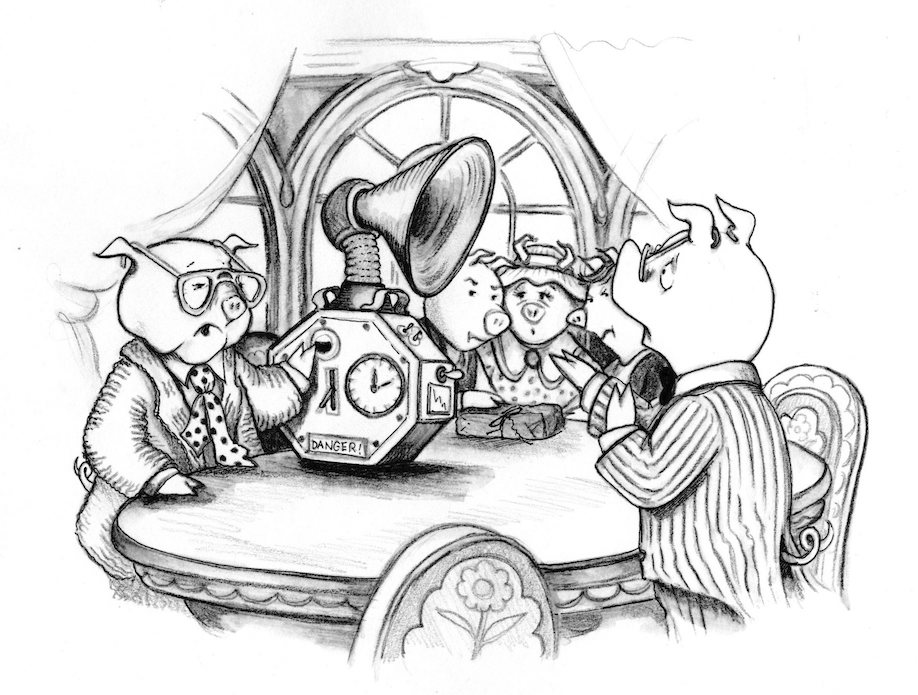Sixth Attempt at Explaining the Importance of
Children's Books
 ...and why grownups should read
them.
...and why grownups should read
them.
Like the title says, I've tried writing this post
five times. I keep sliding into dead ends and inconsequent
thinking.
Why, why, why? When I try to write on this
subject, I end up being trite ("They're classic! Alice in Wonderland!
Beatrix Potter!) or sentimental ("I cried when Old
Yeller died!") or preachy ("Think of the life-lessons in The
Little Match Girl"!). Then my own mind turns traitor and
asks, "Well, Mary, what about serious books? Crime
and Punishment, The Gulag Archipelago, Madame
Bovary, Jude the Obscure?" Cowed, I back away from writing
the post, feeling like an intellectual lightweight. (And I've
read Crime and Punishment, and Jude the Obscure.)
But I return to the subject, because I think it
matters, and seems worth a sixth attempt.
There are certain kinds of insight and thought
that can, IMO, best be expressed in a children's story. Because
it's a forum with unique qualities:
- Safe space. Everybody
opening the book knows nothing irredeemably awful will happen
to the protagonist. This is where I've stumbled in earlier
attempts to write, because excluding the darkest side of life
feels like a cheat, like an artist using only half the
palette. Two different friends, over the years, have asked me
to please kill off a couple of my characters, and I haven't
done it yet. Because what I cherish in literature for the
young is what I sometimes need myself: a safe space. If you've
ever had a few hours to spend in a beautiful spot with no task
to complete, no bills to pay, no feud to fight, and where
benevolence surrounds you - that's the feeling I allow myself
to settle into with a children's book. Oh, there will be
suspense, but you won't encounter the dread of a
gruesome ending. That dread is a feature of much adult
reading. I remember vividly my then-teenage son coming in and
waking me up at one a.m., elated because he'd finished Lord
of the Flies and NOT everybody died. He'd had a
harrowing read. There's a time and place for a harrowing read,
but it's not every time and every place. The
range of possible outcomes in serious literature includes the
very dark part of the fictional color spectrum. The presence
of the dark colors can cut off the brighter end of the
spectrum. Not many authors can manage a full palette. In
children's literature, we're free to read with a cheerful
expectation of a good outcome, once expressed in a gospel
tune: "I read the end of the book, and we win." The happy
assurance of a good outcome can revive hope in a hopeless
heart, and there's something to be said for that.
- Simplicity. Children's
literature, like the parables of Christ, has a simplicity that
eases the first reading, then reveals depth and more depth
upon further readings. Things that can decorate adult fiction
can't be relied on in juvenilia. Small children famously don't
"get" sarcasm, so making points with snark may not make the
point at all. The canny kid-lit author won't depend on
it. (There are exceptions - Lemony Snicket books come to
mind.) And very young readers are so busy processing their
first encounter with suspense or mystery, they'll miss adult
nuances buried in syntax or clues tucked into a description.
The subtlety gets noticed on a second or third reading, but
the book can't depend on that, either - it had better be a
good read on the first pass. So, if I can't make my point with
hints, sarcasm and nuance, how will I make it? In a book for
kids, I must have a gripping story and compelling characters.
Everything else is gravy.
- Magic, Miracles and
Coincidence. Obviously, the impossible is part of adult
literature - that's why there's science fiction and, I add
with tongue in cheek, True Romance. ;) But I get to use it
differently in books for young readers. I get to be
matter-of-fact about miracles. I get to posit the Easter
Bunny, or a winged mailman, or talking
pigs, with a fairly straight face. And the audience will
cut me that slack. If I do my job well, they'll say yes, Mrs.
Coons, we'll go with you to a place you've named Pigville, and
we'll accept the rules that govern it. Pigs ride bicycles and
type with their trotters. When one of my (adult) writer
friends pointed out that my villain's lightning machine
wouldn't really work, I replied, "My concern isn't what's
possible, just what's consistent in my make-believe world.
That's the beauty of writing about talking pigs." She subsided
 . Some of the
"coincidences" that have graced my life would look like
cheating-to-advance-the-plot if I inserted them into a
manuscript. I think kids are smarter than grownups about this.
They'll accept the chance sighting of the White Rabbit and go
with Alice down the rabbit hole; they'll tumble into the
wardrobe with Lucy, and then examine every closet in the house
to see if maybe, just maybe, there's a local portal to
Wonderland or Narnia. I'd argue we'd all be better off with a
bit of that attitude. If we cultivated eyes that see every
daisy as a miracle, if we allowed ourselves, like G. K.
Chesterton, to believe in fairies. To try, like the white
queen in Lewis Carroll's Alice, to "believe six
impossible things before breakfast."
. Some of the
"coincidences" that have graced my life would look like
cheating-to-advance-the-plot if I inserted them into a
manuscript. I think kids are smarter than grownups about this.
They'll accept the chance sighting of the White Rabbit and go
with Alice down the rabbit hole; they'll tumble into the
wardrobe with Lucy, and then examine every closet in the house
to see if maybe, just maybe, there's a local portal to
Wonderland or Narnia. I'd argue we'd all be better off with a
bit of that attitude. If we cultivated eyes that see every
daisy as a miracle, if we allowed ourselves, like G. K.
Chesterton, to believe in fairies. To try, like the white
queen in Lewis Carroll's Alice, to "believe six
impossible things before breakfast."
If we did, we'd be better able to
believe remarkable things about ourselves. Somewhere deep inside,
each of us cherishes the hope that we are special and that,
against all odds, someone sees our specialness. Children's books
take this as a given, and shine a bright light on the path the
hero must take, then give that hero help with serendipitous
meetings and surprising bits of good fortune dumped in his lap.
Such things are the bread and butter of kiddie lit. Adults find
them easy to dismiss. We forget that the odds against each of us
existing at all are overwhelming, that we should thank God for the
day we get to live in, and for the blessings on our plate.
That's my point. Children's books encourage us to
believe good things, impossible things, can happen, and that
they can happen to us. To you, to me. Allow me to close
with a paragraph from my new book, Feathergill's
Fabulous Emporium. This describes my main
character:
The fact is, Elizabeth had no idea how
important she was. It is unpopular, nowadays, for the narrator
to step into the story to tell the reader things, but it seems
necessary in this case, because
our character has no idea... Elizabeth is still walking around
Granger's Green without a clue that the story is all about
her. And while we're at it, we
will add that every person reading this book is in something
of the same predicament. Most of us don't know the importance
of our own story - and in Elizabeth's case, it is almost too late...
Well, clearly you'll have to read the book to find
out what happens. But rest assured, Elizabeth's story holds a
happy ending. Let's consider that this is true for each of us.
If you find this difficult, may I suggest picking up a good
children's book?
For other thoughts on life & literature, sign up for my
blog here.
As always, thanks for reading.
 . Some of the
"coincidences" that have graced my life would look like
cheating-to-advance-the-plot if I inserted them into a
manuscript. I think kids are smarter than grownups about this.
They'll accept the chance sighting of the White Rabbit and go
with Alice down the rabbit hole; they'll tumble into the
wardrobe with Lucy, and then examine every closet in the house
to see if maybe, just maybe, there's a local portal to
Wonderland or Narnia. I'd argue we'd all be better off with a
bit of that attitude. If we cultivated eyes that see every
daisy as a miracle, if we allowed ourselves, like G. K.
Chesterton, to believe in fairies. To try, like the white
queen in Lewis Carroll's Alice, to "believe six
impossible things before breakfast."
. Some of the
"coincidences" that have graced my life would look like
cheating-to-advance-the-plot if I inserted them into a
manuscript. I think kids are smarter than grownups about this.
They'll accept the chance sighting of the White Rabbit and go
with Alice down the rabbit hole; they'll tumble into the
wardrobe with Lucy, and then examine every closet in the house
to see if maybe, just maybe, there's a local portal to
Wonderland or Narnia. I'd argue we'd all be better off with a
bit of that attitude. If we cultivated eyes that see every
daisy as a miracle, if we allowed ourselves, like G. K.
Chesterton, to believe in fairies. To try, like the white
queen in Lewis Carroll's Alice, to "believe six
impossible things before breakfast." ...and why grownups should read
them.
...and why grownups should read
them.